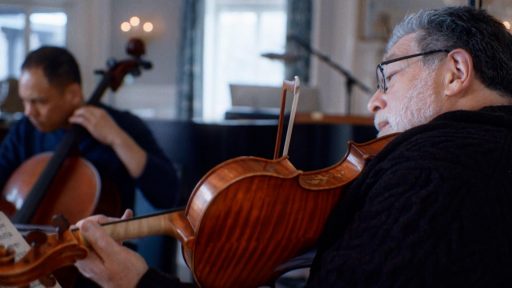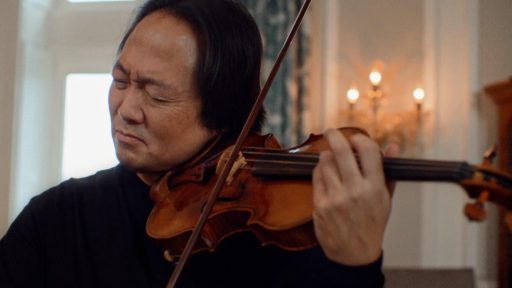Premieres Friday, October 29 at 9 p.m. on PBS, pbs.org/gperf and the PBS Video app
The Series 2 finale of Great Performances: Now Hear This takes a dramatic approach to interpreting the complex musical mind of composer Ludwig van Beethoven, who wrote nearly 800 works in 45 years. Host and violinist Scott Yoo and his team of fellow musicians, including Anna Polonsky (piano), Bion Tsang (cello), Toby Appel (viola) and Emily Daggett Smith (second violin), visit a historic manor in the Berkshires to better understand Beethoven by performing and recording some of his most personal work, including his famous “Ghost Trio.” Unbeknownst to them, they’ve summoned the ghost of the composer, trailed by the spirit of Sigmund Freud who attempts to analyze him. Interweaving documentary, performance and theatrical storytelling, this haunting special episode explores the mind of the composer through dramatized conversations between the spirits of Beethoven and Freud. Great Performances: Now Hear This “Beethoven’s Ghost” premieres Friday, October 29 at 9 p.m. ET on PBS (check local listings), pbs.org/nowhearthis and the PBS Video app for Halloween. The episode is part of #PBSForTheArts, a multiplatform campaign that celebrates the arts in America. For more than 50 years, PBS has been the media destination for the arts, presenting dance, theater, opera, visual arts and concerts to Americans in every corner of the country.
Now Hear This Overview:
Premiering in 2019, documentary miniseries Great Performances: Now Hear This merges music, storytelling, travel and culture as host Scott Yoo chases the secret lives and histories of some of the greatest musicians and compositions ever written. Series 1 features baroque era composers Vivaldi, Bach, Scarlatti and Handel. Series 2 features Classical era composers Haydn, Schubert, Mozart and Beethoven. Series 3 is slated to premiere spring 2022 on PBS. Yoo is the Chief Conductor of the Mexico City Philharmonic, Music Director of Festival Mozaic, Conductor of the Colorado College Music Festival, and the Founder of the Medellín Festicámara, a chamber music and social program in Colombia. He has conducted the London Symphony, Royal Scottish National Orchestra, L’Orchestre Philharmonique de Radio France, Yomiuri Nippon Orchestra, Seoul Philharmonic, Dallas Symphony and San Francisco Symphony, among many others. For more information about the series, visit pbs.org/nowhearthis.
Series Overview:
Throughout its nearly 50-year history on PBS, Great Performances has provided an unparalleled showcase of the best in all genres of the performing arts, serving as America’s most prestigious and enduring broadcaster of cultural programming. Showcasing a diverse range of artists from around the world, the series has earned 67 Emmy Awards and six Peabody Awards. Peek behind the curtain at the Great Performances website for exclusive videos, interviews, photos, full episodes and more. The series is produced by The WNET Group.
Production Credits:
Now Hear This was created by producer, writer and director Harry Lynch and is a production of Arcos Film + Music. Harry Lynch, Scott Yoo and Richard Lim are executive producers. Great Performances is produced by The WNET Group. Bill O’Donnell is series producer and David Horn is executive producer.
Underwriters:
Series funding for Great Performances was made possible by The Robert Cornell Memorial Foundation, the Anna-Maria and Stephen Kellen Arts Fund, Rosalind P. Walter, the LuEsther T. Mertz Charitable Trust, Seton J. Melvin, the Kate W. Cassidy Foundation, Jody and John Arnhold, The Starr Foundation, The Philip and Janice Levin Foundation, the Thea Petschek Iervolino Foundation, Ellen and James S. Marcus, the Estate of Worthington Mayo-Smith and public television viewers.
Websites: http://pbs.org/nowhearthis, facebook.com/GreatPerformances, @GPerfPBS, giphy.com/great-performances, youtube.com/greatperformancespbs #NowHearThisOnPBS #PBSForTheArts


